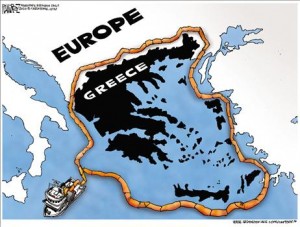The European debt crisis seems to be grinding toward a decisive conclusion after a revolt within the Greek Prime Minister’s cabinet. PM George Papandreou had wanted to put Greece’s euro membership to a referendum, but a number of cabinet members–including his deputy finance minister–have refused. Several socialist MPs have also declared opposition to the referendum, destroying the ruling party’s majority.
“Take the latest bail-out or leave, and decide quick ,” has essentially been the response from Germany and France.
If Greece leaves the euro it is almost certain to default on its debt. In fact, one could argue Greece has actually been defaulting for some time now, though on the face of it bondholders have “voluntarily” taken losses in the interest of European solidarity.
So what does that mean for Greece and the euro? Is it 2008 all over again? Might the sky actually fall?
The Guardian’s Polly Curtis has surveyed a number of scenarios put out by different research outfits:
- “For the eurozone it’s bad,” said Alan Clarke, an economist at Scotia Capital. “A lot of the EU banks are exposed to Greece, the initial ESFS deal said they would lose 21% of value of holdings, now it’s more like 50%. if it’s the whole hog of 100% that would have serious implications for EU banks. It would look like [the bankruptcy of] Lehman Brothers if banks go bust particularly if you have contagion. You have serious risk of bank failures. Take cover. There would be 110% chance of recession if Greece goes bad […] BMP Paribas is exposed to Greek debt by around 5bn euros. France and Germany are in the most vulnerable positions. RBS was exposed but I think Mervyn King told the UK select committee that contingency plans were in place. Although UK banks are not huge directly exposed, indirectly they will be affected and that’s hard to unravel and assess the risk we face.”
- UBS found little comfort in the past: “[I]nstances of monetary union break-ups have tended to produce one of two results. Either there was a more authoritarian government response to contain or repress the social disorder (a scenario that tended to require a change from democratic to authoritarian or military government), or alternatively, the social disorder worked with existing fault lines in society to divide the country, spilling over into civil war. These are not inevitable conclusions, but indicate that monetary union break-up is not something that can be treated as a casual issue of exchange rate policy.”
- Dawn Holland of the National Institute for Social and Economic Research sees two possibilities, depending on investor confidence: 1) the Greek currency devalues and the country attracts huge investment inflows. This, she says, is “the best case scenario.” 2) Nobody invests and Greece’s economy implodes: “inflation, devaluation, banking collapse.”
